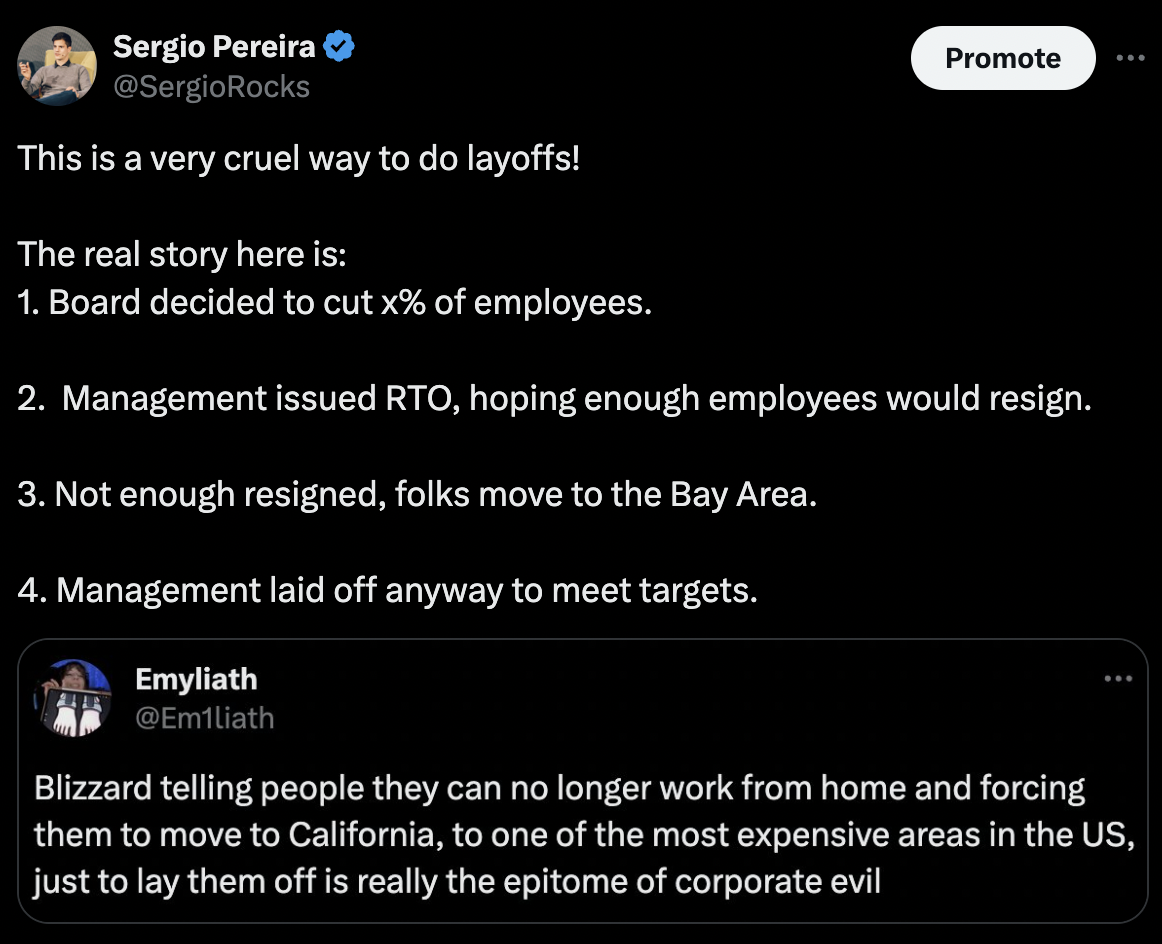Return to the office! What now?
Hey,
I'm Sergio Pereira, and this is the Remote Work newsletter 👋
Last week, I told you that the Remote Jobs Braintrust is going async-first, after Cohort 5. There are still some seats available, and this is the last chance to join. We start on Tuesday at 11am UK time.
Today I'm addressing a common question I'm asked again and again in my Twitter and Linkedin DMs:
• My employer issued a RTO mandate. What can I do to continue working remote?
This is quite serious. Some people have moved back home, to another city or country. Others simply moved away from busy and expensive urban areas to more rural areas. Returning to the office is not simply about the commute, it entails redesigning the whole life for many folks out there.
Furthermore, as I twitted recently, some companies are laying off employees after forcing them to doing such a massive life redesign. This is cruel, and certainly detracts folks from making the effort at all.

I hear these RTO-related questions as a "Mayday! Mayday!" call for help. And I wish I could help them all thrive in a remote career and avoid returning to the office at all.
I recommend a couple things to everyone who feels fragile in this context of layoffs and RTO mandates:
1/ Always be applying
The best way to test your value in the market, is to consistently apply to jobs relevant to your profile and your preferences.
This way you'll have hard data about how many interviews you get. And if you decide to go through them, you have a first row seat into what the process looks like and what kind of salary package you're offered. Regardless what you do about those, creating such options is a pragmatic insurance against layoffs and RTO mandates.
For people who have a full time job, and a family and other life commitments, it can be quite challenging to do this consistent job application process. And that's why I'm creating the JobsCopilot.ai, so that people can setup their profile and preferences and carry on with their life while the AI applies to jobs on their behalf. I'm wrapping private testing this week, and I'll be sending invites to the folks on the waitlist very soon.
2/ Create inbound job opportunities
I cover this in some detail on session 4 of the Remote Jobs Braintrust. There's easy work you can complete in 2 hours that will bring you a constant stream of job opportunities:
Linkedin: If you simply optimise your Linkedin profile with all the right keywords, you'll show up in the first search results when a Recruiter or CTO is looking for people to hire. Folks in the Braintrust community are consistently getting DMs with invites to join interview processes, just by doing this.
Recruiters: Just message recruiters with the roles/salary you're looking for. Search for the ones who engaged with you in the past, and search for new relevant ones. They'll add you to their "database", and reach out to you whenever they have a relevant role for you.
3/ Grow your network
Most people lose touch from past colleagues and managers, as they change jobs. Don't do that. The best opportunities will come to you from folks you worked with in the past. They'll invite you to join their new company, or mention your name in random conversations. Just keep in touch and update them when you're privately job seeking.
Also make an effort to grow your network. Ask for introductions to people at companies you're interested in, like fast growing startups, or companies with a top-notch engineering culture, or those that are heavy in your preferred tech stack. Do it when you don't need it ASAP, since theses things take time to convert into material job opportunities.
You should build leverage for when a rainy day comes. If you ever feel fragile because you were laid off or your employer bullied you to return to the office, you'll have options on the table. And having options makes all the difference in such desperate times.
In case you're looking for a remote job, or thinking of doing it soon, join us for Cohort 5 of the Remote Jobs Braintrust. This is the session schedule:
• Feb 20: Identify your target role
• Feb 21: Pitch your skills and experience
• Feb 22: Make job opportunities come to you
• Feb 27: How to apply to remote jobs
• Feb 28: Remote interview best practices
• Feb 29: Contract types and Salary dynamics
• TBD: Starting a Fractional career
• TBD: Creating an audience on Twitter/Linkedin
• (more sessions will be added based on community requests on Slack)
Thanks for reading this newsletter until the end. You can read all past editions here. Make sure to share it with your friends and colleagues so they can read it too.
See you next Friday,
Sergio Pereira,
Startup CTO & Remote Work Lover


